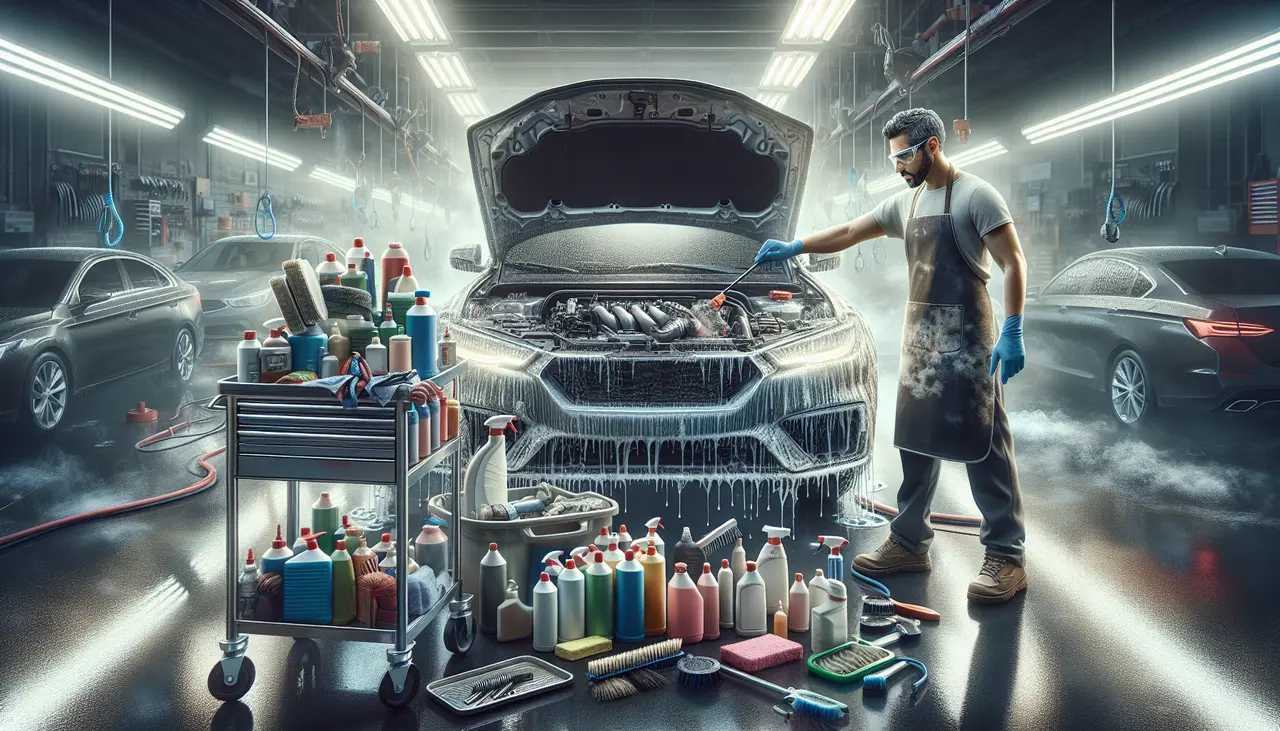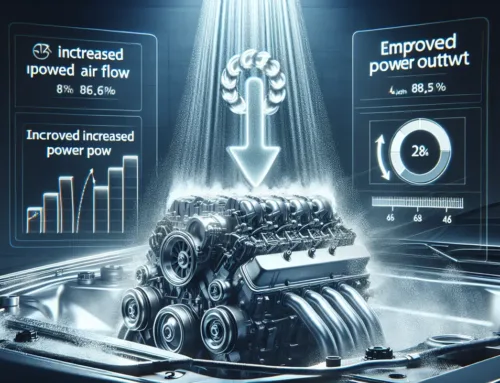Introduction to Engine Wash in Professional Car Detailing
An engine wash in professional car detailing is about more than just making your car’s engine look good. It’s a practical step to maintain your car’s health and efficiency. By removing dirt, grease, and grime from the engine bay, a thorough clean can help prevent rust and corrosion. This isn’t just for old cars. New cars benefit too, keeping systems running smoothly. A clean engine also makes it easier to spot leaks and issues before they turn into bigger problems. Professionals use specific equipment and products to ensure a deep clean without harming engine components. It’s a wise move for any car owner.
Why is Engine Wash Important for Your Vehicle?
An engine wash isn’t just about making your engine look good; it’s about keeping your vehicle in top shape. Dirt, grease, and grime on your engine can trap heat, causing your engine to run hotter than it should. Over time, this extra heat can wear down engine parts faster. Also, a clean engine makes it easier to spot leaks and other issues early before they turn into bigger, more expensive problems. Regular engine washes can help your vehicle run more efficiently, potentially improving fuel economy. In short, keeping your engine clean is key to maintaining your car’s health and performance.
Types of Engine Wash Services Offered by Professionals
When it comes to professional car detailing, there are a few different types of engine wash services you might encounter. First, there’s the basic engine wash. This service focuses on removing surface dirt and grime using a degreaser and a low-pressure wash. It’s a quick, straightforward process that gives your engine a cleaner appearance.
Next, we have the steam cleaning option. This method uses steam to deeply penetrate and dissolve tough grease and buildup without the harsh chemicals. It’s great for getting into those hard-to-reach spots and is generally considered eco-friendlier.
Another popular option is the detail engine cleaning. This service goes beyond just cleaning; it includes degreasing, steam cleaning, and then applying a dressing to the engine components to make them look like new. It’s a thorough process that not only cleans but also helps in protecting and preserving the engine’s parts.
Finally, for those who are looking for the ultimate care, some professionals offer a performance engine clean. This specialized service may include tuning, replacing certain parts, and using high-grade products to enhance the engine’s performance along with cleaning. It’s designed for car enthusiasts or those with high-performance vehicles.
Each of these services has its benefits, depending on your needs and the condition of your car’s engine. A basic wash could suffice for regular upkeep, but for deeper cleaning or performance enhancement, you might consider one of the more detailed options.
Preparing Your Car for an Engine Wash: Steps to Follow
Before you hand over your keys for an engine wash, it’s smart to prep your car. Here’s the deal. First, make sure the engine is cool. Driving directly to the wash bay? Wait a bit—hot engines and water don’t mix well. Secondly, remove loose items from under the hood. We’re talking about stuff like leaves, trash, or any personal items you’ve stashed in there. Check the engine oil and coolant caps are on tight to avoid water getting into places it shouldn’t. If you’re savvy, disconnect the battery. It’s a safety thing – water and electricity are a bad combo. Lastly, cover sensitive parts like the alternator, air intake, and electrical components. Use plastic bags or wrap—this step is key. Now, your car’s set for a professional engine wash without any hitches. Safe, clean, and ready to rev.
The Engine Wash Process: What Happens Step by Step
First, the professional will check your engine’s condition to make sure it’s cool and safe for washing. Then, they protect critical components like the alternator, engine control unit, and air intake with waterproof covers. Next, they apply a degreaser to break down grime and oil. After letting it sit, they scrub the tough spots gently with a brush. Using low pressure, they rinse the engine thoroughly, ensuring no degreaser residue is left behind. Finally, they dry the engine, often using compressed air, and remove protective covers. Once dry, they might apply a protectant to help prevent future dirt buildup and corrosion. This step-by-step care ensures your engine not only looks good but runs smoothly too.
Key Benefits of Getting a Professional Engine Wash
Getting your engine professionally washed can seem like just an extra. But, it’s way more than just making it look good. First off, a clean engine runs cooler. Dirt and grime act like a blanket, trapping heat. By removing that gunk, your engine doesn’t have to work as hard to cool down. Second, it’s about spotting problems early. Oil leaks? Frayed belts? They stick out once the dirt is gone. Early detection can save you from big repair bills down the road. Third, it ups your car’s value. Imagine you’re buying a used car. Two identical models, but one has a clean, shiny engine. Which would you think has been better taken care of? Exactly. Lastly, it’s protection. A clean engine is less likely to suffer from corrosion and rust, making it last longer. Investing in a professional engine wash does more than just spruce up the area under the hood; it’s smart car maintenance that pays off.
Common Concerns and Myths About Engine Washing Debunked
A lot of folks get jittery at the thought of washing their car’s engine, worried about the possible harm it might bring. Let’s cut through the noise and tackle some common concerns and myths head-on. First off, the big fear: “Water could wreck my engine.” Not quite true. Modern engines are designed to withstand moisture from rain and splashes. Professionals know their way around an engine bay and can wash it safely without causing any damage. They avoid sensitive components like the air intake and electrical parts.
Next up, the myth that engine washing is purely cosmetic. Wrong. A clean engine runs cooler, is easier to work on, and lets you spot leaks or issues more easily. It’s not just about looking good; it’s practical too.
Some believe that engine cleaning is a lengthy and expensive process. It’s actually pretty straightforward for a professional, and the cost is reasonable, especially considering it can help prevent costly repairs down the line.
Lastly, the misconception that you can easily do it yourself at home with just a hose. While it’s possible, if you’re not careful, you could cause serious damage. Professionals have the right tools and knowledge to do it safely.
In short, engine washing, when done by experts, is safe, beneficial, and worth considering as part of your car’s maintenance routine. Don’t let these myths hold you back from taking good care of your ride.
Post-Engine Wash Care: Tips to Maintain Your Engine’s Cleanliness
After getting a professional engine wash, keeping that fresh, clean look is all about regular maintenance. Here are some straightforward steps to ensure your engine stays clean and in top shape:
-
Check and clean regularly: Peek under the hood every month. Look for leaves, debris, or oil spills. Wipe these off with a clean, dry cloth. For oil spills, a bit of degreaser will do the trick. Just make sure the engine is cool before you start cleaning.
-
Stay on top of leaks: Oil, coolant, or other fluid leaks can not only make your engine dirty but also signal bigger problems. If you see any, it’s time for a check-up. Fixing leaks early can save you a lot of cleaning and repair work later.
-
Protect electrical parts: Before you clean, cover sensors, the battery, and other electrical components. Water and electrical parts don’t mix. Keeping these parts dry will avoid damage and costly repairs.
-
Use the right products: When you do clean your engine, choose cleaners made specifically for engines. Other products might be too harsh and can damage engine parts. Follow the product instructions to a T.
-
Dry it properly: After cleaning, make sure your engine is thoroughly dry. You can use a microfiber cloth or compressed air. This step prevents moisture from causing rust or corrosion.
Remember, a clean engine is not just about looks. It can run cooler, be more efficient, and last longer. Plus, routine checks while you clean can help catch any issues early. Keep it simple, stick to these tips, and your engine will thank you.
How Often Should You Get an Engine Wash?
You might think washing your car’s engine is only for gearheads or the overly finicky, but it’s quite the opposite. Regular engine washes are essential for maintaining your car’s health. However, the big question is, how often should you get it done? Well, most car experts agree that getting your engine cleaned professionally at least once a year is a good rule of thumb. If you frequently drive in harsh conditions, like dusty roads or snowy areas where roads are salted, bumping that number to twice a year can prevent grime and salt from causing corrosion. Remember, a clean engine runs cooler and more efficiently. So, don’t wait for the buildup to cause problems. Regular engine washes can save you from costly repairs down the line.
Conclusion: Enhancing Your Car’s Performance and Lifespan with Regular Engine Washes
Getting your car’s engine washed regularly isn’t just about keeping it looking good. It’s about something more important. This simple act can significantly improve your car’s performance and extend its lifespan. Over time, gunk, dirt, and grime build up in your engine. If left unchecked, this can lead to overheating, reduced power, and even major engine damage. On the flip side, a clean engine runs cooler, more efficiently, and is less likely to need costly repairs down the line. It’s a straightforward choice, really. Regular engine washes are an investment in your car’s health and your peace of mind. Think of it as routine maintenance that keeps your car running smoothly and reliably. And when it comes time to sell, a well-maintained engine boosts your car’s value. So, don’t overlook the power of a clean engine. It’s the heart of your car, and giving it the care it deserves means you’ll enjoy a better driving experience for years to come.









Leave A Comment